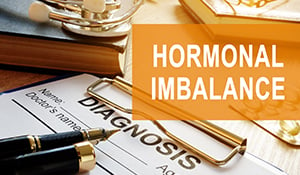Symptoms Of Hormonal Imbalance

Hormonal imbalances can occur in men, women and children. As your body’s chemical messengers, hormones play an important role in regulating normal bodily functions. They are produced in the endocrine glands before being transported to different parts of the body, essentially instructing your organs and tissues what to do. When you have too much or too little of a certain hormone, hormonal imbalance occurs. As hormones are crucial in key bodily processes such as metabolism and reproduction, any imbalances should not be overlooked.
Hormonal Imbalance in Men
Men experience hormonal imbalance when their bodies do not produce enough testosterone. Below are some common symptoms:
- Breast tenderness and the development of breast tissue
- Sparse facial and bodily hair
- Loss in muscle mass
- Hot flashes
- Erectile dysfunction
- … and more
Hormonal Imbalance in Women
It is important to note that women can experience natural hormonal imbalances during pregnancy, breastfeeding and menopause. Polycystic ovary syndrome (PCOS) is the most common form of hormonal imbalance in women of reproductive age. Some symptoms include:
- Excessive growth of facial and body hair
- Heavy or irregular periods
- Acne on the face, upper back and/or chest
- Skin tags
- Night sweats
- Headaches
- … and more
Hormonal Imbalance in Children
Children with hormonal imbalances typically do not go through normal puberty. This condition is known as hypogonadism, which is when the sex glands produce little to no sex hormones.
Symptoms in boys include:
- Voice does not deepen
- Body hair does not grow or is sparse
- Lack of muscle mass
- Excessive growth of limbs in relation to body
Symptoms in girls include:
- No growth of breath tissue
- Menstruation does not begin
- Delayed growth rate
What Causes Hormonal Imbalance?
Hormonal imbalances can be caused by any or a combination of the below factors:
- Certain medications
- Hormone therapy
- Eating disorders
- Stress
- Chemotherapy
- Tumors
- Injuries
In addition, having certain conditions such as diabetes, thyroiditis, Cushing syndrome and more can exacerbate the effects of hormonal imbalance. In women, causes such as premature menopause or the consumption of birth control pills can also result in hormonal imbalance.
Diagnosing Hormonal Imbalance
If you suspect you suffer from a hormonal imbalance, a medical professional will diagnose this through any of the following methods:
- Ultrasound to get images of the uterus, ovaries, testicles and/or thyroid gland
- Blood test
- Pelvic exam
- Biopsy
- MRI
- X-ray
- Sperm count test
Start with Integrative Treatment at Yang Institute
When you suffer from a hormonal imbalance, it can be hard to pinpoint the exact cause. It can even be a combination of factors. Conventional methods of treatment will simply target the symptoms you experience, however, you may be looking for a long-term solution. If so, consider integrative medicine. From functional medicine to advanced nutrient therapy, our experienced physicians at Yang Institute will identify the root cause of your hormonal imbalance to formulate a treatment plan tailored to your individual needs and circumstances.
If you have any questions or would like a recommendation, please feel free to contact us.